
According to the American Society of Civil Engineers (ASCE) there are at least 46,154 bridges in the U.S. that are ‘structurally deficient’ and 231,000 still need repair and preservation work. In addition, a report, released by the American Road and Transportation Builders Association, estimates it would take nearly 40 years to repair the current backlog of ‘structurally deficient’ bridges in the U.S. at the current pace.
Not only do bridges in poor condition pose heightened challenges in rural communities, which often may rely on a single bridge for the passage of emergency service vehicles, they also are a nightmare for potential supply chain issues.
Take closure of the I-40 Hernando DeSoto bridge as just one example. When this bridge closed in May of 2021 due to a cracked beam, over-the-road truckers had to take alternate routes, adding about eight-minutes to their drive. Those additional minutes and miles on the detour added a daily cost to the trucking industry of $2.4 million per day, according to the American Transportation Research Institute.
In a society struggling with supply chain issues, the passage of the Infrastructure Investment & Jobs Act (IIJA) could not come at a better time. The $1.2 trillion legislation will invest $110 billion of new funds for roads, bridges and major projects, and reauthorizes the surface transportation program for the next five years building on bipartisan surface transportation reauthorization bills passed out of committee earlier this year.
The bill includes a total of $40 billion of new funding for bridge repair, replacement and rehabilitation, which is the single largest dedicated bridge investment since the construction of the interstate highway system. The bill also includes around $16 billion for major projects that are too large or complex for traditional funding programs but will deliver significant economic benefits to communities.
Bridges a Priority
When discussing the IIJA, President Joe Biden promised to fix the 10 most "economically significant" bridges in need of reconstruction and repair 10,000 additional smaller bridges as well. As a result, the Bridge Investment Act, was been signed into law by President Biden at the same time he signed the IIJA.
The final bill includes provisions that will:
- Provide $12.5 billion to fund the Bridge Investment Act, which establishes a bridge investment program to award competitive grants to certain governmental entities for projects that improve the condition of bridges as well as the safety, efficiency and reliability of the movement of people and freight over bridges;
- Require strong Buy America rules, by requiring all projects funded by the grants to use American-made steel and iron;
- Ensure that a transportation bill could rehabilitate or replace bridges of all sizes, including nationally significant large bridges, like the Brent Spence Bridge between Ohio and Kentucky;
- Create an innovative evaluation process for proposed projects to ensure the fair and efficient allocation of federal funding;
- Provide quick grants for small bridge projects and allow projects to be bundled into a single application to cut down on red tape and accelerate repairs;
- Allow entities of all sizes and scope to apply for funding, including: states, counties, cities, metropolitan planning organizations, special purpose districts, public authorities with transportation functions, federal land management agencies and Indian tribes
The Brent Spence Bridge passes over the Ohio River to connect Cincinnati, Ohio, with Kentucky and is key to trucking goods from Florida to Michigan along an interstate corridor. But it's also known as one of the most congested bridges in the country.
A $2.7 billion plan calls for keeping the Brent Spence Bridge and building a new bridge directly next to it, alleviating traffic around the Cincinnati region. The proposal has been on the shelf for years and the design is ready to be implemented. Lawmakers including President Biden, Senate Minority Leader Mitch McConnell of Kentucky and Republican Sen. Rob Portman of Ohio, one of the architects of the infrastructure bill, all recently pointed to the Brent Spence Bridge as a project that could benefit from the new spending package.
It's likely that federal funds would cover a portion of the cost, with states and localities also chipping in.
Other senators who were key to passage of the Bridge Investment Act expressed their appreciation for priorities on bridges in the IIJA:
“Bridges in Massachusetts and across our country are falling apart, threatening the safety and security of people who rely on these arteries for evacuation routes, commerce, and transportation,” said Senator Markey. “That’s why I am proud our legislation is included in the Infrastructure Investment and Jobs Act, which will make an historic $12.5 billion investment in bridge repair and replacement projects across the country. This new fund will allow us to improve both the safety and efficiency of infrastructure like the Sagamore and Bourne Bridges on Cape Cod, which connect the nearly 250,000 people living on the Cape and Islands to the rest of Massachusetts and are in desperate need of replacement. I look forward to working with the Biden administration to implement this program so that we can compete for the critical funding we need.”
The bipartisan infrastructure legislation also includes a new formula grant program for states dedicated to providing further funding to our nation’s bridges. Over the next five years, this formula grant program will provide $27.5 billion over the next five years toward further rehabilitation, repair, and replacement of our nation’s bridges.
The last World Economic Forum Competitiveness Report ranked the United States 13th in the world for overall quality of infrastructure. Not only does the IIJA solve for elemental health and safety problems like lead drinking water pipes and aging bridges and roadways, it also meets our nation’s needs of today through this critical and timely investment.




















